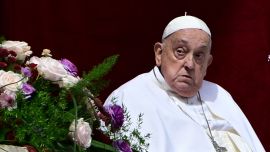Pope Francis launched fresh consultations Wednesday on the future of the Roman Catholic Church, which faces pressure over the role of women and the ongoing scourge of clerical child abuse.
The General Assembly of the Synod, comprising 368 religious and lay people – including women – from around 100 countries, will hold closed-door debates at the Vatican until October 27.
The synod had already gathered for a month-long assembly in October 2023, after a three-year worldwide consultation among Catholics to help guide the institution through the 21st century.
It is a personal project of the pope, 87, who will have the final say on any doctrinal changes that ensue.
Last year, the assembly addressed themes as varied as attitudes towards LGBTQ people, polygamy, the ordination of married men and the fight against the sexual abuse of children by priests.
Although the body resisted pressure to allow women to become deacons – clergy who are able to celebrate baptisms, marriages and funerals but not masses – calls continue for more visibility and space for women in an institution still run by men.
The meeting comes shortly after the pope drew criticism during a trip to Belgium of his stance on women and what he has called a "murderous law" authorising abortion.
But no decisions are expected any time soon.
After an outcry among conservatives at the pope's decision last December to allow blessings of same-sex couples in some circumstances, Francis has entrusted the most sensitive issues to working groups that will report back next June.
'Place of listening'
Since becoming head of the world's almost 1.4 billion Catholics in 2013, the Jesuit has sought to reform the Church's governance – but has encountered major internal resistance.
Launching the assembly with a mass in St Peter's Square on Wednesday morning, Francis urged participants to enter the discussions with an open mind.
"Let us be careful not to see our contributions as points to defend at all costs or agendas to be imposed," he said, warning of the risk of "locking ourselves into dialogues among the deaf".
He added that the meeting was "not a parliamentary assembly, but rather a place of listening in communion".
The assembly will deliver their conclusions on October 26.
On the eve of the talks, Francis held a "penitential" vigil attended by around 2,500 people in St Peter's Basilica.
There, he again asked forgiveness and expressed his "shame" for the abuse by priests that has overshadowed the Church's work across the world.
People at the vigil heard from a South African former choirboy who was assaulted by a priest when he was just 11.
The victim denounced a lack of transparency and responsibility in and by the Church that he said had shaken the faith of millions of people.
"We are here as beggars of the Father's mercy, asking for forgiveness," Francis said.
"How could we be credible in our mission if we do not acknowledge our mistakes and stoop to heal the wounds we have caused by our sins?" he added.
Seven cardinals echoed the pope's words, among them Sean O'Malley, until recently archbishop of the US city of Boston, who expressed his "shame" for "abuses that have stolen innocence."
The assembly process was launched by Pope Paul VI in 1965. Last year's meeting was the first time women were allowed to vote.
– TIMES/AFP
by Clément Melki, AFP



















Comments